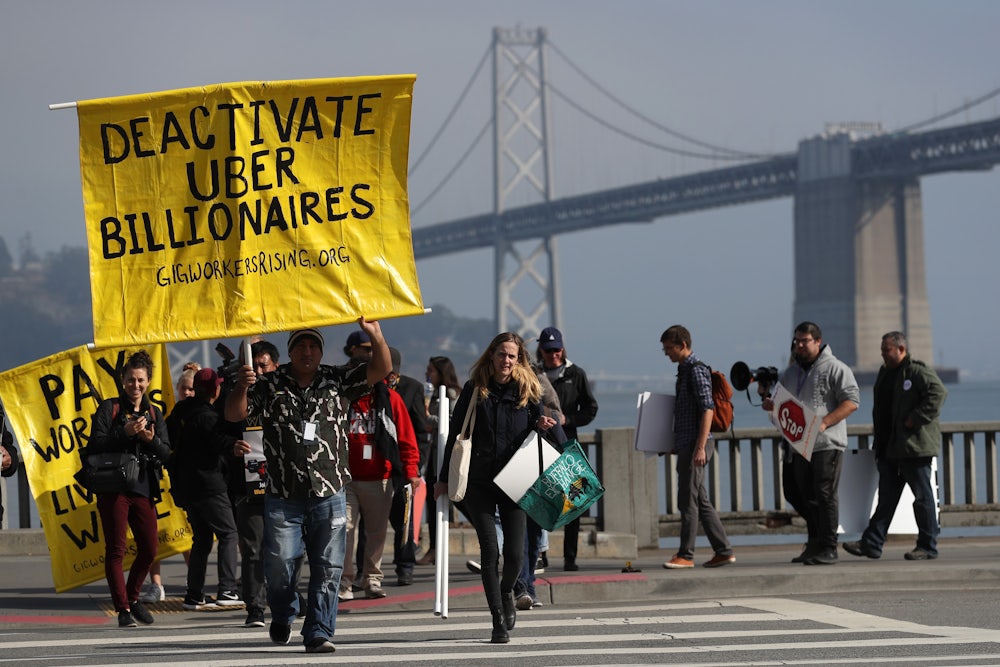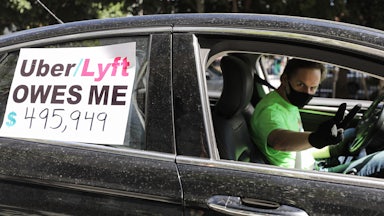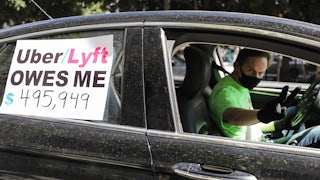Last year, while promising better pandemic-era treatment for their workers, gig companies like Lyft and Uber poured more than $200 million into a propaganda campaign in favor of Proposition 22, a ballot initiative in California that would solidify workers as something less than employees deserving full benefits. Despite driver protests, vigorous media campaigns from both sides, and the sheer obscenity of putting hundreds of millions of dollars into a political campaign that could otherwise have been spent on giving vulnerable drivers health care, the measure passed. And it seemed all but assured that, with the success of Prop 22, well-capitalized gig companies would replicate the model, pushing for similar measures across the country. Within days of Prop 22’s passage, activists discovered an emerging ad campaign in Illinois devoted to the same cause.
On Friday, the balance of power shifted—potentially dramatically—when California Superior Court Judge Frank Roesch ruled that Proposition 22 was both unconstitutional and “unenforceable.” One major problem with the law was it called for future state laws dealing with collective bargaining to be in accordance with Prop 22—a requirement that seemed designed to defend companies’ bottom lines above all else. As Judge Roesch wrote, “It appears only to protect the economic interest of the network companies in having a divided, ununionized workforce, which is not a stated goal of the legislation.” In other words, the transparently political nature of Silicon Valley’s Prop 22 campaign was made clear. Any pretense of trying to help drivers by solidifying their nonemployee status should be thrown out; as the judge recognized, this was clearly an effort to give companies unreasonable control over drivers’ lives and the legislative process—and to pay workers less.
Judge Roesch’s decision was celebrated by drivers, worker advocates, and the nascent union organizing efforts taking place throughout the industry. As a riposte to the big-money skullduggery of gig platforms that seem to have unlimited industry backing, Friday’s ruling was a heartening sign that the courts may be on the side of workers. But it also signaled the tremendous struggle ahead, as ride-hailing companies promised to escalate the court battle through an appeal, a process that could take months. (There were also immediate promises of higher fares.) Copycat Proposition 22–style campaigns are taking place all over the country, and as in California’s, they depend on a lot of industry cash and a deliberate muddling of what “benefits” and full-time employment actually are. Simply, these campaigns are designed to try to confuse voters. As polling found after Prop 22 initially passed, 40 percent of people who voted “yes” on the measure—that is, who voted in favor of the industry’s position—thought they were “ensuring Uber/Lyft and DoorDash employees can earn livable wages.”
In New York, the gig companies recently tried to sidestep the ballot process—and a costly public lobbying campaign—by making a deal with local unions and legislators, but they were unable to reach an agreement. The state remains one to watch, along with Illinois and practically everywhere else that might soon play host to one of these campaigns. As of now, though, the front lines are shifting from California to the East Coast, where another industry-friendly ballot measure is being prepped in time for the 2022 midterms, with both sides claiming that they’ve learned important lessons from California and Prop 22.
In Massachusetts, a group called the Massachusetts Coalition for Independent Work, which receives money from DoorDash, Uber, and Lyft, stated that the California judge’s ruling will have “no impact” on a comparable ballot measure for which it is collecting signatures. Meanwhile, a similarly named—but politically diametrically opposed—group, the Coalition to Protect Workers’ Rights, is fighting back by asking a judge to throw out the proposed ballot measure as unconstitutional, and by releasing a statement that pledged to “fight [industry’s] $100 million copycat lobbying campaign to create a permanent underclass of workers in Massachusetts.” The state’s battle has already seen many of the elements that defined the Prop 22 campaign in California: texts and other not-so-subtle messages sent to drivers advising them about the legislation; soft-focus interviews with loyal drivers touting the company line; and huge amounts of cash coming in from out of state.
As shown by this scattered landscape of legal, legislative, and propaganda conflict, it’s a fitful war. On one side are unions that are emptying their modest war chests; on the other are gig companies with seemingly infinite cash, lawyers, and creative ways of separating workers from their rights and decent pay. It takes a certain amount of public coercion and sheer gall to convince voters that limiting the rights of drivers will somehow make for a more just workplace and a better economy. The wink-and-a-nod element at play here is the subtle acknowledgment that for consumers, giving more rights to workers might mean slightly higher prices on car rides and food delivery. (The horror!) But playing to self-interest, even by having just a few more dollars in one’s wallet, can go far in the political marketplace.
In addition to the various copycat campaigns it’s spawned, Prop 22 itself isn’t going away, at least not until the judicial appeals process has run its course. It remains in effect in California, where drivers’ effective minimum wage was found to be $5.64 in one study. But worker demands go beyond a decent minimum wage and full-time employee status to other issues of algorithmic employment, including the ability to be fired—or “deactivated”—simply because one’s star rating drops too low or other secret trip wires are set off. Workers have protested these conditions outside the home of Uber CEO Dara Khosrowshahi and are planning a similar one outside the mansion of DoorDash CEO Tony Xu.
As attention turns to Massachusetts and the next round of judicial decision-making, it’s worth taking stock of what this is all for. Gig platforms, some of them vastly unprofitable and with shaky stock prices, are spending hundreds of millions of dollars to change the law in their favor, to deprive the bulk of their workers of the rights to which they should be entitled. It’s not just an injustice; it’s a way of ensuring that some of tech’s biggest gig platforms have an immiserated, captive workforce—contrary to all claims toward drivers’ “independence”—for years to come. Uber, Lyft, and their peers haven’t quite been able to pull off their supposedly revolutionary business model; they still lose gobs of money. But perhaps if they keep fighting to change the law and keep their workers in a box, they can con their way into profitability.








